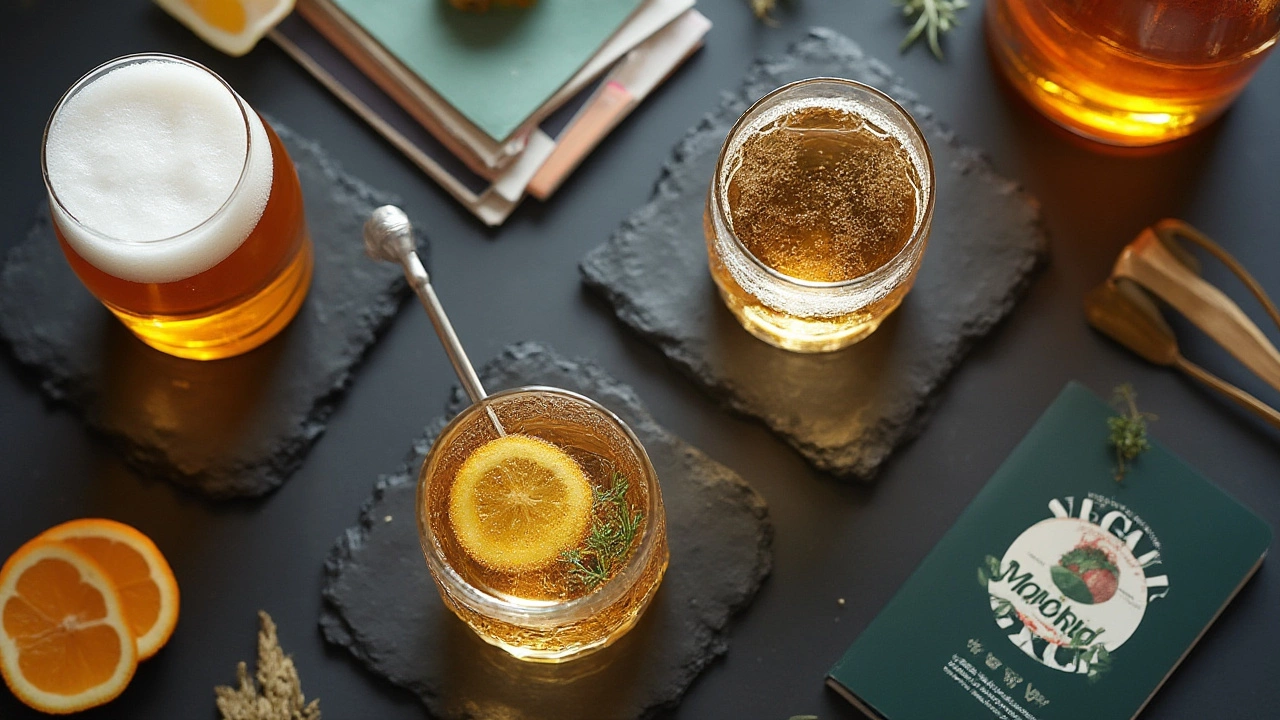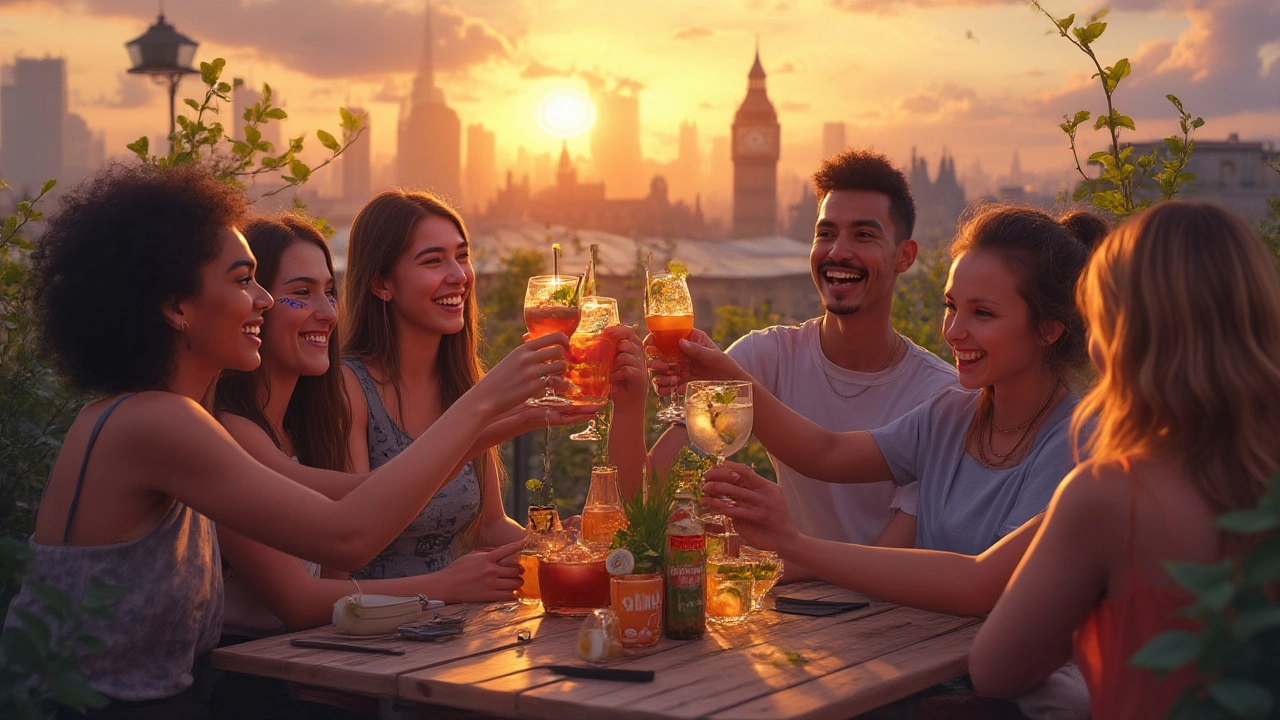If you've ever clinked glasses at a party and wondered whether your drink fits with your vegan values, you're not alone. The idea that alcohol is just plants and yeast sounds safe enough, right? But the truth is way messier—and sometimes a bit sneaky. It turns out that being vegan isn't just about what you eat, but what you sip, swirl, and toast. So, if you want your next Friday night to line up with your ethics, or if you're just plain curious why some booze isn't vegan, you're in the right spot.
Why Some Alcohol Isn't Vegan
On the surface, alcohol looks so simple—grapes for wine, barley for beer, potatoes or grains for vodka. Should be fine for vegans, yeah? The catch is in the details. Loads of mainstream beers and wines get filtered and clarified using animal products like isinglass (a kind of gelatin from fish bladders), egg whites, gelatin, or even milk proteins. Winemakers love adding these to fine-tune the look and taste, but they don't usually let you know on the label. Spirits can be trickier, too, since stuff like honey, cream, or even dyes from insects (yep, cochineal bugs) sneak into recipes.
Maybe that sounds odd, but it's actually the result of centuries of tradition—most started long before anyone cared if booze was vegan. Back in the day, dropping an egg white into wine was the easy fix for cloudy barrels. Beer brewers turned to fish bladder gelatin because it did wonders for making ales crystal clear. Fast-forward to now, and not every drink brand has updated their methods. When I started digging for this article, I was honestly stunned at just how secretive the whole process still is in 2025, even though vegan drinkers are everywhere.
If you ask around in Melbourne, plenty of bartenders have stories about confused vegans sending back cocktails after finding out their margarita was made with honey or their bright red liqueur came from squashed insects. Even a simple cider, which feels harmless, can have gelatin added during production. It's wild how many drinks fly under the radar.
| Common Alcohol Ingredient | Source | Is It Vegan? |
|---|---|---|
| Isinglass | Fish (swim bladders) | No |
| Gelatin | Pork / Beef bones, skin | No |
| Casein | Milk | No |
| Egg Whites | Eggs | No |
| Bentonite Clay | Mineral | Yes |
| Activated Charcoal | Plant or animal | Maybe |
| Carmine (E120) | Insects | No |
| Honey | Bees | No |
If you want your drinks to be fully plant-based, ingredients lists and labels just won't cut it. In Australia, and actually most of the world, alcohol labeling laws aren't strict about disclosing animal-derived processing aides. The bottle might be silent about those fishy or milky extras, especially with wine. It makes things even trickier for vegan folks—and let's be honest, who wants to do detective work at the bottle shop every Friday night?

The Most Vegan-Friendly Drinks and How to Find Them
So, what can a vegan actually drink and enjoy with zero stress? Luckily, plenty! If you fancy spirits like vodka, gin, tequila, and most whiskeys, you're in luck. These are usually vegan because they're distilled—any non-vegan stuff burns off in the process or just isn't necessary for clarity. Flavored spirits, though, demand more attention: that caramel liqueur might have cream, or that “honey whiskey” is obviously out.
Want a beer at a footy game? You need to check the brand or brewery. As of last year in Australia, Coopers, Mountain Goat, Stone & Wood, and several craft breweries have gone fully vegan across their main beers—no animal products for filtering, and no honey beers in their core range. Globally, big brands like Heineken, Corona, and Guinness (after 256 years!) have shifted to vegan fining too. But there are still some laggards in the world of dark ales and lagers. Check out their sites or send a quick message if you're not sure. Isinglass is old-school now, but it still pops up in smaller traditional breweries.
Wine gets the trickiest—almost half of Australian wine producers in 2024 admitted in an industry survey that they still used some animal-based agents at least once a year, especially egg white and isinglass. Your best bet is to hunt for bottles labeled “vegan-friendly,” and thankfully, the list is way longer than it used to be. Brands like Yalumba, Temple Bruer, and Angove Wine have built their names on vegan wine. Some even splash the vegan label right on the front these days (finally catching up with plant-based eaters!). You can also look for Organic wines, which are more likely to use mineral-based clarifiers like bentonite clay — safer for vegans.
Cider is the wildcard. Plant-based cider brands in Australia like Willie Smith's and Somersby make it easy, and they're up-front about their animal-free approach in 2025. Just look out for the boutique ciders, as some still use gelatin fining or honey blends. Ask or do a quick search on your phone—once you know, you're sorted.
If you're lost in a bottle shop, there's a secret weapon: Barnivore.com. It's a giant, crowdsourced database that cuts the guesswork by listing which beers, wines, and spirits are vegan or not—over 52,000 entries as of last month! It's saved many a vegan night out. Another handy tip? Download the Vivino or Vegaholic apps. Scan a label and get an instant answer—no more awkward conversations with uninformed clerks. Speed and peace of mind, right?
Looking at spirits and cocktails, here's where you need your wits. No Baileys (that Irish cream is thick with dairy!), no honey-based liqueurs, and avoid that classic Campari from Italy if you spot "carmine" or "E120" in the ingredients—it's the telltale bug dye. For cocktails, ask about the mixers and syrups—they sometimes include egg whites (like in a pisco sour or a classic whiskey sour), honey, or cream.
Pro tip: loads of modern bars here in Melbourne now offer “vegan whisky sours” made with aquafaba (the liquid from canned chickpeas) instead of egg whites. It's honestly magic—same froth, same fun, none of the chicken worries. And bartenders are used to swapping in coconut cream or nut milks if you want your espresso martini or creamy cocktail without dairy or eggs. Just ask, and most peeps are happy to help.
- For beer: Look for “fined with bentonite,” “unfiltered,” or “vegan-friendly” on labels.
- For wine: Seek out vegan certifications or organic labels.
- For spirits: Check the website for any warnings on flavors or animal products.
- If you're traveling, European wines and ciders are more likely to use isinglass than Aussie or NZ ones.

The Rise of Vegan Alcohol and How to Drink Smarter
What’s wild is just how fast the drinks world is catching up with vegan demand. In 2023, the global plant-based beverage industry was already worth more than $25 billion, and vegan-certified alcohol was a big part of that growth. Australia’s own wine and spirits groups are predicting a jump of over 40% in vegan-labeled alcohol options by 2026, all thanks to pressure from smart, passionate drinkers and a much bigger plant-based crowd. Even the big bottle shops like Dan Murphy’s and First Choice have their own vegan shelves now. It used to be a niche thing, now you’ll find vegan drops right in the main aisle, shoulder to shoulder with the classics.
Drinking vegan isn’t about giving up your favorite night out or the ritual of sharing a bottle with mates. The choices are more open, more public, and honestly way easier than they were even five years ago. Quentin, my son, laughs at me when I check wine labels with my phone for dinner parties (“Dad, that’s so old-fashioned—just order by the vegan filter!”). The younger crowd expects vegan drinks as standard, and bars that don’t keep up are starting to feel it in their bottom line. There’s a local bar near my place in Fitzroy that started a Vegan Tuesday Happy Hour in early 2025—now it’s standing room only every week, packed with folks who care about what’s in their glass, not just the taste.
Want to throw a vegan party yourself? Easy. Start with the spirits—pure vodka, gin, bourbon, rum—then add mixers or juices or make fun, simple cocktails (nothing with cream, honey, or eggs). For beer, stick with the major Aussie brands above or look up the microbrewery on Barnivore. For wine, pick from a vegan-labeled range or go for a reputable organic brand. You'll be set for any mix of vegan, vegetarian, or omnivore guests. No fuss, no second guessing.
If you’re traveling, things change between countries. UK beers tend to be vegan by default, unless they're traditional English cask ales (where isinglass is still common). In the USA, craft beer labels are more open now, but watch for honey or “milk stouts” that contain lactose. Sake from Japan? Mostly vegan, as they stick with traditional rice and koji fermentation, though modern “flavored” versions need a second look.
If you want to look after the planet as well as the animals, you’ll be happy to know that vegan alcohol is usually more sustainable, too. Using bentonite clay or plant proteins for filtering means less waste compared to animal by-products, and it lines up with carbon-reduction efforts, too. According to Wine Australia, swapping animal fining agents for vegan ones cuts the wine industry’s waste output by 20%! It’s cleaner, greener, and just feels better, honestly.
- Remember: most clear spirits are your safest bet when in doubt.
- If you love cocktails, get friendly with aquafaba and creamy oat or soy mixers.
- Search for vegan wine using apps or look for "vegan-friendly" on the label.
- At pubs or bars, don’t be shy about asking—hospitality staff in Australia are keen on keeping up with vegan trends.
The future of drinking looks pretty plant-based, honestly. And you don’t have to worry your next toast is at odds with your ethics. That’s a win, mate.

